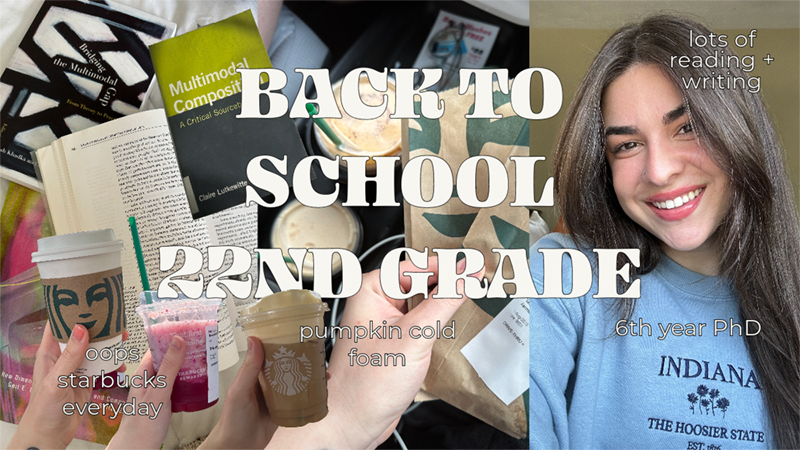I hardly remember a time before social media. I made my first email account to instant
message my friends after school when I was in elementary school (AIM “away messages” were iconic). I made a MySpace account when I was 12 years old, only for it to be quickly replaced by Facebook; then a few years later, supplemented with Tumblr, Instagram, and most recently— YouTube. Documenting our everyday lives and connecting with others online has been foundational for me and for my generation. I was drawn to the field of digital rhetoric because of the unique power held by social media platforms to tell seemingly mundane stories in compelling ways that not only connect us with others but give us agency over our lives and bodies.
Like many graduate students, I struggled to manage my impostor syndrome when I began my program. Furthermore, the sedentary nature of online working from home at the start of the COVID-19 pandemic left me feeling detached from my body. In an effort to feel more connected to my body and to relate with other graduate students, I started a lifestyle vlogging channel on YouTube. This channel showcases my everyday experiences as a Ph.D. student at a large, R-1 university in the Midwest navigating research and teaching responsibilities as I strive for a sustainable work-life balance. I highlight the highs and the lows of this lifestyle, expressing all of the vulnerable emotions that come with them. As a woman, I have found reclamatory potential in filming, editing, and publishing these lifestyle vlogs. In a patriarchal society that often objectifies women, I aim to subvert the male gaze by rhetorically and agentially crafting my embodiment online.

My experience with this YouTube channel has inspired my dissertation research and allowed me to reimagine my teaching practices. My dissertation, From Writers to Content Creators: Teaching, Embodiment, and Multimodal Composition, explores the scholarly and pedagogical potentials in vlogs as they are situated as material sites of both multimodal and embodied composition. Moreover, I have had the opportunity to teach a first-year digital literacy class themed around social media influencers, where students analyze popular content creators as they grapple with complex social issues like race, gender, sexuality, age, etc. and produce multimodal artifacts like webpages, podcasts, and video essays. And I have taught a 200-level intensive writing course where students explore how people use video to tell stories online and then apply what they have learned to tell digital stories of their own.
I am excited to be a DRC fellow, and I look forward to collaborating with others on projects that explore the role of multimodal composition in our teaching and learning sites. I am particularly interested in cultivating conversations around embodiment and digital technology, especially as they pertain to gender and intersectional feminism. I am eager to use this platform to continue the exciting innovation of the Computers & Writing community at large.
You can email me at samafisc@iu.edu or explore my vlogs at
www.youtube.com/sarahfischervlogs
